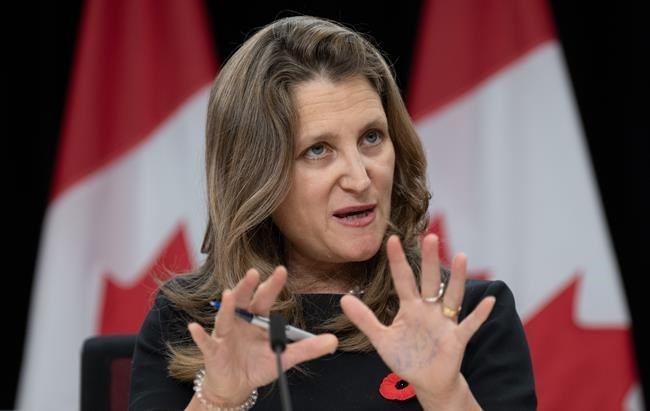OTTAWA — Finance Minister Chrystia Freeland is expected to table the federal government's fall economic statement on Nov. 21, a mini-budget that will serve as an update on federal finances and contain new measures that reflect the government's priorities.
Freeland has promised that the fall economic statement will focus on housing and affordability, two issues dominating federal politics that are top-of-mind for Canadians.
The Liberals have already announced some measures pertaining to housing over the last couple of months, but all eyes will be on any additional steps they take to help ease the housing shortage.
The federal government is also facing fiscal pressures from a slowing economy and scrutiny for excessive government spending.
Given the uncertain economic times, Freeland has promised to prioritize fiscal responsibility.
The Canadian economy is staring down a potential recession as high interest rates weigh on economic growth.
Gross domestic data show the economy shrank in the second quarter, and a preliminary estimate from Statistics Canada suggests it contracted again in the third quarter.
Two consecutive quarters of negative growth would meet the definition of a technical recession, but economists generally look for signs of a broader slowdown to call a recession.
The economic contraction is expected to affect federal revenues, giving the government less room to finance new measures.
The parliamentary budget officer projected last month that the federal deficit would rise to $46.5 billion in 2023-24, up from $35.3 billion for 2022-23.
The senior director of Canadian economics for Desjardins, Randall Bartlett, says the economic outlook has shifted considerably, putting the federal government in a tricky spot when it comes to its finances.
"Economists now expect that economic activity is much weaker in 2024 than the federal government anticipated in budget 2023, which is going to ultimately weigh on revenues and lead to a larger deficit than was anticipated at the time in the budget," Bartlett said.
Desjardins is expecting the federal deficit projections to come in higher than what was anticipated in the spring budget, but only by a few billion dollars per year, on average.
Bartlett warned that additional measures will be announced that have not been costed yet, which could push the deficit even higher.
"So not only is the starting point going to be weaker for the economic outlook, but we're layering on all of this additional spending, much of which has not been fully costed yet," he said.
On Thursday, Treasury Board President Anita Anand tabled the federal government's updated spending plan in Parliament, which includes $20.7 billion in additional spending for the current fiscal year that will need to be approved by parliamentarians.
Following up on a promise in the spring budget to find savings in the public service, the Treasury Board says $500 million in travel and professional services funding has been "refocused and removed" across 68 departments this fiscal year.
This report by The Canadian Press was first published Nov. 9, 2023.
Nojoud Al Mallees, The Canadian Press




